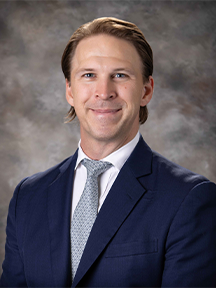 Will Rutland, M.D.In October 2024, the UAB Heersink School of Medicine’s Montgomery Psychiatry Residency received funding from the city of Montgomery to start Alabama’s first Street Psychiatry clinic. The city provided this funding in response to a call for proposals aimed at addressing the Opioid Epidemic in Montgomery’s vulnerable populations. The UAB Montgomery Psychiatry Residency program proposed a Street Psychiatry clinic designed to provide treatment for Opioid Use Disorder and co-occurring mental illness to Montgomery’s unhoused and unstably housed residents, and the city awarded the residency $345,676 to actualize this proposal.
Will Rutland, M.D.In October 2024, the UAB Heersink School of Medicine’s Montgomery Psychiatry Residency received funding from the city of Montgomery to start Alabama’s first Street Psychiatry clinic. The city provided this funding in response to a call for proposals aimed at addressing the Opioid Epidemic in Montgomery’s vulnerable populations. The UAB Montgomery Psychiatry Residency program proposed a Street Psychiatry clinic designed to provide treatment for Opioid Use Disorder and co-occurring mental illness to Montgomery’s unhoused and unstably housed residents, and the city awarded the residency $345,676 to actualize this proposal.
The Street Psychiatry clinic, known as the Homeless Outreach and Psychiatry Education or HOPE clinic, will focus on treating members of the unhoused and unstably housed community in the places where they live. This strategy has been used successfully by similar Street Psychiatry clinics in a growing number of major metropolitan areas throughout the country, and it will be Alabama’s first psychiatry clinic to adopt this approach.
Once the HOPE clinic goes live, attendings and trainees from the residency program will work with staff and team members to treat opioid use disorder, unintentional opioid overdose, and co-occurring mental illness by traveling to areas where the unhoused population lives and providing care directly in the community. Residency staff will also collaborate with community embedded providers to facilitate wrap-around services for the clinic’s patients, attending to their social, biological, and psychological needs to reintegrate patients into broader society.
The HOPE clinic is overseen by Will Rutland, M.D., program director of the psychiatry residency program in Montgomery. The residency will incorporate the clinic into its educational mission as a training experience available to residents throughout their four years of residency. Trainees will work closely with community partners to provide care and build trust within the homeless community to combat Opioid Use Disorder and co-occurring serious mental illness.
“We know that we have to approach this work with humility,” states Rutland. “Simply walking into these communities as outside medical professionals won't work. We will rely on our community partners to help us build relationships so that members of the underserved communities of our city can trust that we will meet them where they are and that we will keep showing up."
In service to building these relationships, the residency included funds to purchase warm socks and food cards in the grant budget. Providing these simple necessities will help break down barriers and build trust with the people the clinic hopes to serve. Once trust is established, the program can start providing substance use and psychiatric care.
Other funds have been reserved to purchase psychiatric medications, including over $150,000 set aside to purchase Suboxone and Narcan kits. Coordinating the prescribing and providing these medications has allowed the residency to strengthen its ties to local safety-net providers, pharmacy leaders, and community advocates.